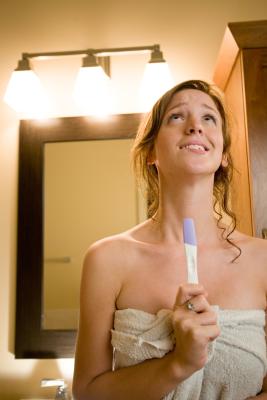If you have ever tried to plan a pregnancy, or tried to plan to avoid one, you know that your body isn’t fertile all the time. There is a brief span of time when you have an egg waiting to be fertilized. The rest of the time, you have no egg and can’t conceive. Still, because sperm can stay in your body for a few days, there are some ties that are better than others for getting pregnant, when you’re not technically ovulating.
When Ovulation Occurs
Ovulation, or the release of an egg to be fertilized, most commonly takes place two weeks before your period starts. In women with regular 28-day cycles, ovulation usually happens in the middle of the menstrual cycle. Women with longer or shorter cycles and women who ovulate or menstruate irregularly might ovulate at different points throughout the cycle, or not at all. That makes it tricky to determine when you are most and least likely to be fertile. Using ovulation predictor kits, monitoring cervical mucus and taking your basal body temperature can help you determine when you ovulate.
How Long Sperm Live
Under the right conditions, sperm ejaculated into your vagina can live upward of five days. That means if you have sex five days before you ovulate, you could get pregnant even though you weren’t technically fertile that day. That’s why it’s so important to have a good understanding of your own fertility cycle.
Worst Time to Get Pregnant
Since most women are fertile toward the middle of their cycles, and since the egg only lives 12 to 24 hours, the worst times to get pregnant are the days right before, during and after menstruation. During these times, it’s less likely that you have an available egg. Intercourse during these times can still result in a pregnancy because it’s possible to ovulate at any time. For most women, intercourse during this time frame won’t result in pregnancy.
Best Time to Get Pregnant
If you are actively trying to get pregnant, the best time to have intercourse is the time period that starts three days before ovulation and extends to the day of ovulation itself. This usually happens in the middle of the cycle, or two weeks before menstruation, but if you rely on this general time frame and you have an irregular cycle or ovulate early or late, you could miss your fertility window.
Stress
It might be a bad time to get pregnant if you are suffering from a lot of stress. Stress affects hormone production, which, in turn, affects ovulation. The added stress of trying to conceive can make things even worse. If you have a high-stress job or if you are experiencing a great deal of stress from positive experiences in your life, like a wedding or the holidays, consider yoga, talking with friends, seeing a counselor and getting enough exercise to help you de-stress. The more relaxed you are, the easier it will be for you to get pregnant.





